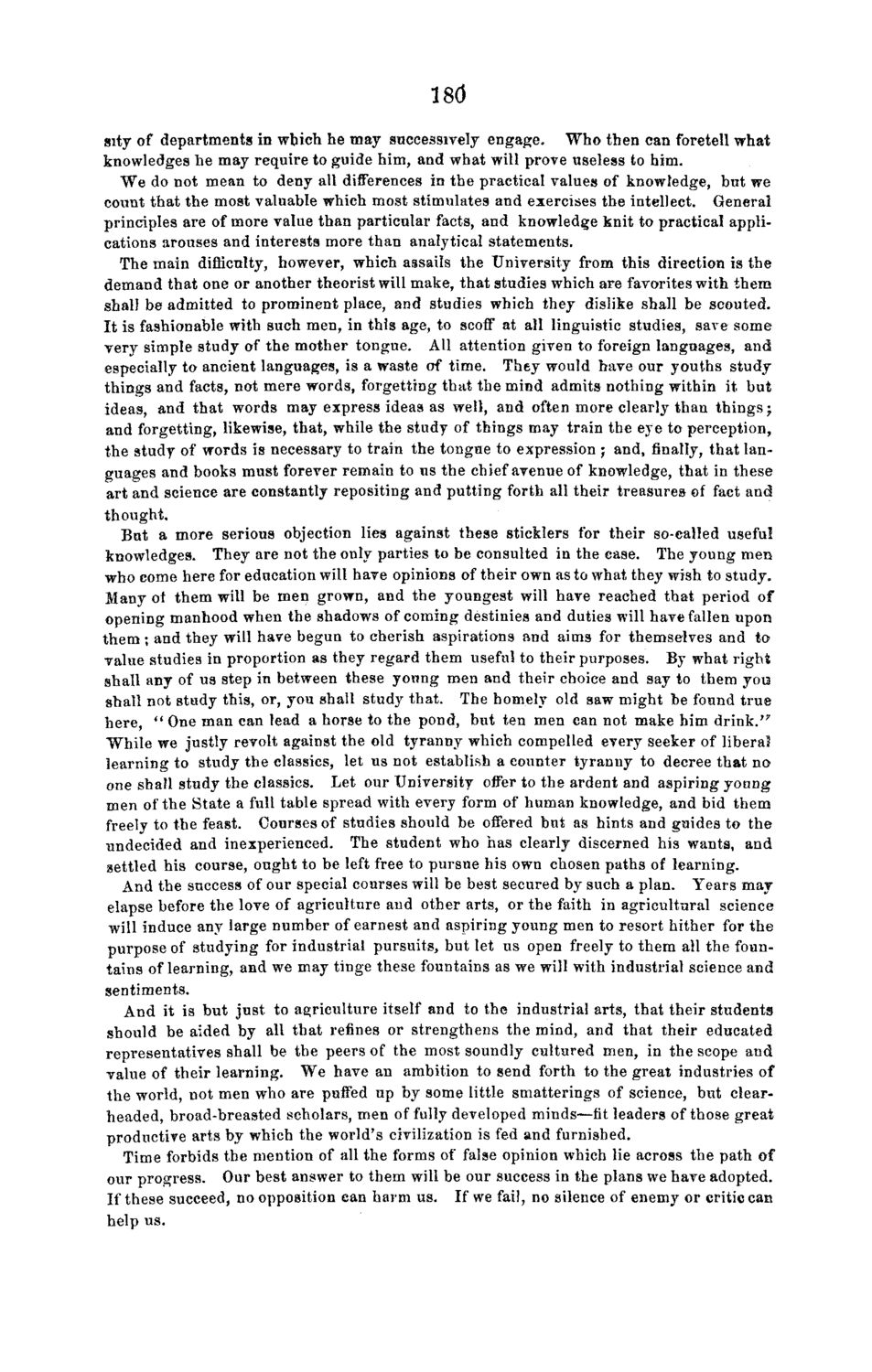| |
| |
Caption: Board of Trustees Minutes - 1868
This is a reduced-resolution page image for fast online browsing.

EXTRACTED TEXT FROM PAGE:
180 sity of departments in which he may successively engage. Who then can foretell what knowledges he may require to guide him, and what will prove useless to him. We do not mean to deny all differences in the practical values of knowledge, but we count that the most valuable which most stimulates and exercises the intellect. General principles are of more value than particular facts, and knowledge knit to practical applications arouses and interests more than analytical statements. The main difficulty, however, which assails the University from this direction is the demand that one or another theorist will make, that studies which are favorites with them shall be admitted to prominent place, and studies which they dislike shall be scouted. It is fashionable with such men, in this age, to scoff at all linguistic studies, save some very simple study of the mother tongue. All attention given to foreign languages, and especially to ancient languages, is a waste of time. They would have our youths study things and facts, not mere words, forgetting that the mind admits nothing within it but ideas, and that words may express ideas as well, and often more clearly than t h i n g s ; and forgetting, likewise, that, while the study of things may train the eye to perception, the study of words is necessary to train the tongue to expression j and, finally, that languages and books must forever remain to us the chief avenue of knowledge, that in these art and science are constantly repositing and putting forth all their treasures of fact and thought. But a more serious objection lies against these sticklers for their so-called useful knowledges. They are not the only parties to be consulted in the ease. The young men who come here for education will have opinions of their own as to what they wish to study. Many of them will be men grown, and the youngest will have reached that period of opening manhood when the shadows of coming destinies and duties will have fallen upon them ; and they will have begun to cherish aspirations and aims for themselves and to value studies in proportion as they regard them useful to their purposes. By what right shall any of us step in between these young men and their choice and say to them you shall not study this, or, you shall study that. The homely old saw might be found true here, " One man can lead a horse to the pond, but ten men can not make him drink.' 7 While we justly revolt against the old tyranny which compelled every seeker of libera! learning to study the classics, let us not establish a counter tyranny to decree that no one shall study the classics. Let our University offer to the ardent and aspiring young men of the State a full table spread with every form of human knowledge, and bid them freely to the feast. Courses of studies should be offered but as hints and guides to the undecided and inexperienced. The student who has clearly discerned his wants, and settled his course, ought to be left free to pursue his own chosen paths of learning. And the success of our special courses will be best secured by such a plan. Years may elapse before the love of agriculture and other arts, or the faith in agricultural science will induce any large number of earnest and aspiring young men to resort hither for the purpose of studying for industrial pursuits, but let us open freely to them all the fountains of learning, and we may tinge these fountains as we will with industrial science and sentiments. And it is but just to agriculture itself and to the industrial arts, that their students should be aided by all that refines or strengthens the mind, and that their educated representatives shall be the peers of the most soundly cultured men, in the scope and value of their learning. We have an ambition to send forth to the great industries of the world, not men who are puffed up by some little smatterings of science, but clearheaded, broad-breasted scholars, men of fully developed minds—fit leaders of those great productive arts by which the world's civilization is fed and furnished. Time forbids the mention of all the forms of false opinion which lie across the path of our progress. Our best answer to them will be our success in the plans we have adopted. If these succeed, no opposition can harm us. If we fail, no silence of enemy or critic can help us.
| |